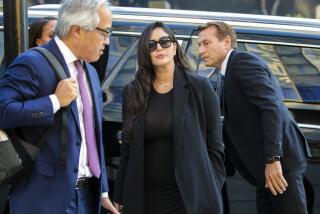Tobacco Suit Lawyers to Get Record $8.1 Billion
An arbitration panel Friday awarded $8.1 billion in fees to attorneys representing the first three states to settle lawsuits against the cigarette industry, a record-shattering decision that cannot be overturned by any appeal.
Although the lawyers were expected to be handsomely rewarded for their role in the landmark settlements reached by Mississippi, Florida and Texas with the tobacco industry in 1997, the amount exceeded predictions.
The sheer size of the award triggered outrage by Texas Gov. George W. Bush, one tobacco company and a dissenting member of the arbitration panel, who charged that the attorneys are being unjustly rewarded and that the decision will undermine public confidence in the tobacco arbitration and the entire judicial system.
If future arbitration decisions in the tobacco cases recently settled by 46 other states for $206 billion are based on the formula used for the first three states, then the attorneys representing those other states might get about $20 billion in additional fees from the industry.
But the attorneys receiving the money defended the decision, asserting that they took on large risks in pressing the suits and that the states stand to reap tens of billions in benefits beyond the monetary settlements in the case. The three states settled the cases for a total of $34.6 billion.
The arbitrators awarded $3.4 billion to 11 law firms representing Florida, which by itself was the largest legal fee award in history. The panel also granted $3.3 billion to six firms representing Texas and $1.4 billion to 13 private law firms representing Mississippi.
One law firm--Ness, Motley, Loadhlolt, Richardson & Poole of Charleston, S.C.--will get a chunk of all three awards. Meanwhile, Scruggs, Millette, Bozeman & Dent of Pascagoula, Miss.--will get a share of the money in both Mississippi and Florida.
Moreover, since each of those firms represents about two dozen other states that recently settled with the industry as part of a $206-billion, 46-state deal, they stand to reap hundreds of millions, perhaps billions of dollars more in fees.
Even though the fees are to be paid by the industry--and therefore by cigarette smokers through higher prices--rather than by state taxpayers, the whopping awards are likely to generate controversy.
Indeed, former federal Judge Charles B. Renfrew of San Francisco, one of the three members of the arbitration panel, issued a vigorous dissent to what he called “excessive fees,” saying they “will undermine public confidence in this arbitration, in our profession and in our civil justice system.”
Renfrew, who was the industry’s choice to serve on the three-judge panel, acknowledged that “by any standard, the work of the attorneys was phenomenal, and they richly deserved to be compensated for their efforts. However, there are limits, even in these cases, to the amount attorneys should be paid.”
Fees Included, Critics Contend
In addition, some critics already have contended that the states might have gotten larger settlements but for the fact that the industry factored in potentially large legal fees when they decided how much to pay the states.
But some of the lawyers hardly were apologizing for their newfound riches. “We brought a rogue industry to its knees begging for mercy with a tin cup in their hands,” trumpeted Ronald L. Motley of Charleston, who was the co-lead counsel in Florida and Mississippi and would have played a key role in the Texas case too, if it had gone to trial.
Motley is already a millionaire many times over from his triumphs against the asbestos industry over the last two decades.
His partner Joseph Rice noted that when their firm and the Scruggs firm first sued the tobacco industry in 1994, skeptics called the suits costly and unwinnable. “We’ve proven them wrong and we are proud. We took the risk, we accomplished everything we were asked to do by the attorneys general, and we made the tobacco companies pay for it.”
The attorneys general from each of the three states vigorously supported the fee applications, as did Florida’s lame-duck Democratic Gov. Lawson Chiles. The lawyers also submitted detailed analyses from economists about the value of the settlement--including an assessment that the Florida agreement would yield the state $30 billion in noneconomic benefits over the next 50 years.
Under an agreement reached with the industry earlier, the tobacco companies did not oppose any of the fee awards. However, that will not be the case in the arbitrations involving the states that settled last month with the industry. And in a prepared statement, Brown & Williamson Tobacco Corp. said the future fee applications will be vigorously contested.
The panel that heard these cases was headed by John Calhoun Wells of Reston, Va., a well-known labor arbitrator who was mutually agreed on. Renfrew also sat on each of the cases as the industry’s choice. In each state, the plaintiffs chose a different person as their member: respectively, Texas Tech Law School Dean Frank Newton, and attorneys Harry Hue in Florida and Jack Dunbar in Mississippi. There will be a new arbitration panel for the cases taken up next year.
Award of 10% of State’s Money
This panel awarded each set of lawyers a flat 10% of what the state got in its suit: for example, $401 million of Mississippi’s $4.1 billion settlement. The panel majority then also awarded a “success” multiplier which took into account the degree of difficulty of the case and other factors.
The highest multiplier--a factor of 3.5--was awarded in Mississippi, the first state, in May 1994, to sue the industry.
The awards are expected to be paid out over 25 years, and the unpaid balance of the fees will be adjusted each year for inflation. But under the arbitration agreement, the industry will pay out no more than $500 million in legal fees each year, and that includes yet-undetermined fees in the 46 other state cases the industry just settled.
Tobacco analysts estimate the industry is spending $600 million per year for its own attorneys in fighting lawsuits.
Wells, chairman of the panel, who previously served as an arbitrator in a number of major labor disputes, said the panel considered a number of factors in making the awards. Among them are that:
* The results achieved were extraordinary.
* The cases include significant ‘noneconomic’ benefits, such as programs to reduce youth smoking, as well as restrictions on the advertising and marketing of cigarettes.
* These were landmark cases that provided public health and economic benefits to the states and, ultimately, the nation in the form of lower medical costs and recaptured worker productivity due to the anticipated reduction in smoking.
* The outside lawyers joined these cases at considerable risk and expense--$50 million out-of-pocket expenses in the three cases.
But Renfrew contended the awards were totally out of whack with established practice in setting fees, including the process used by a New York federal judge who recently awarded $144 million in fees in a $1-billion settlement of a massive securities swindle.
Renfrew contended that it was ludicrous for the Mississippi lawyers to have gotten in essence a 35% contingency fee, an amount he said would have been “politically unacceptable” in the state. Motley retorted that Renfew’s assessment was askew, taking into consideration that Mississippi ultimately would get $7 billion in the settlement, because of an inflation adjustment.
But the size of the award was immediately lambasted by Brown & Williamson, even though its lawyers were part of the industry team that agreed to this arbitration process.
$7,500 an Hour, Industry Says
“If the Mississippi award were evenly distributed to each of the 29 lawyers who the arbitrators told worked on the case, they would receive the equivalent of $7,500 an hour--assuming they worked eight hours per day, five days a week, for the three years the case was pending,” said company spokesman Mark Smith.
“This compares to the $10 per hour earned on average by the combined Mississippi household . . . put another way, it would take 70,000 Mississippi households--or more than the entire combined populations of Vicksburg, Columbus and Pascagoula--working an entire year to earn what the Mississippi legal team has been awarded for its work on this single lawsuit.”
Some of the plaintiffs’ lawyers, including W.C. Gentry of Jacksonville, Fla., said a number of them planned to make “seven figure charitable contributions” to groups involved in the anti-smoking battle in the near future.
Richard Scruggs, lead partner of the Pascagoula firm representing 24 states, has pledged $1 million a year for the next 25 years to pay for professors’ salaries at his alma mater, the University of Mississippi, the largest such endowment in the college’s history.
Not all lawyers suing the industry were pleased with their fees. Milberg, Weiss, Bershad, Hines & Lerach, whose suit led to R.J. Reynolds’ abandoning its controversial Joe Camel advertising campaign, asked for hundreds of millions of dollars in fees but received only $8 million. Patrick J. Coughlin, Milberg’s lead lawyer on the case, called the decision “crushing” but said he is looking forward to trying a case against the industry in Ohio in February.
More to Read
Sign up for Essential California
The most important California stories and recommendations in your inbox every morning.
You may occasionally receive promotional content from the Los Angeles Times.










